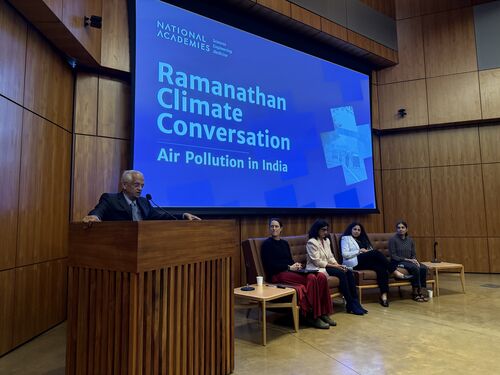Advancing Climate Assessments: 50 Years of Progress and Impact
Program News
By Amanda Purcell
Last update August 4, 2025
The second in a series of retrospectives on National Academies’ reports and activities related to climate science.
As our understanding of climate change grew over the last 50 years, efforts to communicate what is known and the implications for decision making have emerged and evolved hand-in-hand. Climate assessments—conducted by governments, international bodies, and non-governmental organizations—are critical processes for bringing the scientific community together with those who use their findings to produce trusted decision-relevant information.
The National Academies have played pivotal roles in advancing climate assessments. Many of the reports featured in our first retrospective dating back to the 1970s and 1980s could be considered assessments, in that they brought together leading experts to review the literature and summarize what was known in a manner that could inform policy and other decisions. These early reports helped demonstrate the value of regular updates on the state of the science, especially for a rapidly-evolving field that integrates many kinds of knowledge.
Before long, both the international community and the United States initiated major climate assessment efforts. The Intergovernmental Panel on Climate Change (IPCC) was established in 1988 and has worked with the international community to produce six assessment reports. Two years later, the U.S. Congress passed the US Global Change Research Act, which calls for a scientific assessment focused on domestic impacts and trends, 25 and 100 years out.
As these assessment processes, along with similar efforts conducted by some states and cities, became more established, the role of the National Academies shifted to providing a detailed technical review of the draft assessment reports and offering advice on how to improve the assessment processes.
The National Academies conducted detailed technical reviews of the last three National Climate Assessments (in 2023, 2018, and 2013), as well as ten more narrowly focused assessments. Each of these technical reviews provided hundreds of comments that the assessment authors considered carefully. In this way, the National Academies’ reviews have played a critical function of ensuring that each assessment met high standards for scientific accuracy and effective communication. For example, while the review of the draft 5th National Climate Assessment found many ways to improve the document, it also concluded that the draft assessment “successfully meets the requirements of the federal mandate, provides accurate information, and effectively communicates climate science to the public, decision makers, and other stakeholders,” giving users confidence that the information is credible.
Over this time, the goals and approaches to assessments have evolved, reflecting the increasing demand for useful climate information. A 2007 report, Analysis of Global Change Assessments: Lessons Learned, found that effective assessments include strong leadership, extensive engagement with interested and affected parties, a transparent science-policy interface, and well-defined communication strategies.
The importance of engaging users of scientific information throughout the process, from developing the framing and questions to be addressed through to providing guidance on how to present information to be most useful and used, is a recurring theme across many National Academies reports related to assessments. Recognizing that more work is needed to ensure assessments are useful, the 2024 report, Developing a Strategy to Evaluate the National Climate Assessment provided guidance on how to identify and measure the uses and usefulness of the National Climate Assessment (NCA) and selected other USGCRP products.
The National Academies revisited the role of climate assessments in 2017 with the report, Accomplishments of the US Global Change Research Program. This report found that assessments produced by the federal government “have been of demonstrable value to the nation in informing decisions at all levels of government, within the private sector, and among the public.”
“Thousands of scientists have contributed to climate assessments, sharing their knowledge of how climate change is unfolding and what it means for people and places around the world,” said Amanda Staudt, Climate Crossroads Senior Director. “This remarkable cooperation has produced incredibly valuable resources to help anticipate and navigate changing climate conditions. The need for trusted science-based information is only increasing as we confront new climate impacts.”
Developing a Strategy to Evaluate the National Climate Assessment
Review of the Draft Fifth National Climate Assessment
Making Climate Assessments Work: Learning from California and Other Subnational Climate Assessments: Proceedings of a Workshop
Review of the Draft Fourth National Climate Assessment
View Publication " resources="[object Object]">
Review of the Draft Second State of the Carbon Cycle Report (SOCCR2)
Review of the Draft Climate Science Special Report
A better understanding of what is changing and why can help decision makers in the public and private sectors cope with ongoing change. Accomplishments of the U.S. Global Change Research Program highlights the growth of global change science in the quarter century that the USGCRP has been in existence, and documents some of its contributions to that growth through its primary functions of interagency planning and coordination, and of synthesis of research and practice to inform decision making.
" resources="[object Object],[object Object]">
Accomplishments of the U.S. Global Change Research Program
Review of the Draft Interagency Report on the Impacts of Climate Change on Human Health in the United States
This NCA has been a significantly more ambitious effort than previous assessments, in terms of the scope of topics addressed and the breadth of public engagement processes involved. Some of the important new areas include the use of "traceable accounts," the articulation of needs for future research and a vision for an ongoing assessment process, the outreach efforts to help various stakeholders define their climate-related information needs, and the initial (though incomplete) effort to assess the current state of climate change response activities around the nation. Given the current state of the science and the scope of resources available, we believe the NCA did a reasonable job of fulfilling its charge overall. Although more needs to be done to fully meet the nation's needs for information and guidance, such needs cannot be met without an expanded research effort on the part of the USGCRP and future assessments.
The Panel suggests that the NCA report would be improved by addressing the numerous specific problems and concerns and the more cross-cutting issues raised in the consensus answers to the Task Statement questions—which include, for instance, the need to:
1. provide a clear overarching framework for the report that helps readers understand climate change as part of a complex system with interacting physical, biological, and human social/economic dimensions, and offers practical guidance on using iterative risk management strategies to make decisions in the face of large uncertainties;
2. clearly acknowledge how climate change affects and is affected by other types of major global environmental changes and other societal developments;
3. offer an explicit discussion about the uncertainties associated with the regional model projections presented in the NCA draft;
4. take full advantage of the e-book format planned for this document through strategic use of hyperlinks among different parts of the report and other innovative approaches that help guide the experience of the NCA's diverse audiences.
As the nation continues to engage with the threats, opportunities, and surprises of climate change in its many manifestations, the 2013 NCA should prove to be a valuable resource, as a summary of the state of knowledge about climate change and its implications for the American people.
" resources="">
A Review of the Draft 2013 National Climate Assessment
Informing Decisions in a Changing Climate
Review of the U.S. Climate Change Science Program's Synthesis and Assessment Product on Temperature Trends in the Lower Atmosphere
More like this
Discover
Events
Right Now & Next Up
Stay in the loop with can’t-miss sessions, live events, and activities happening over the next two days.
NAS Building Guided Tours Available!
Participate in a one-hour guided tour of the historic National Academy of Sciences building, highlighting its distinctive architecture, renowned artwork, and the intersection of art, science, and culture.




